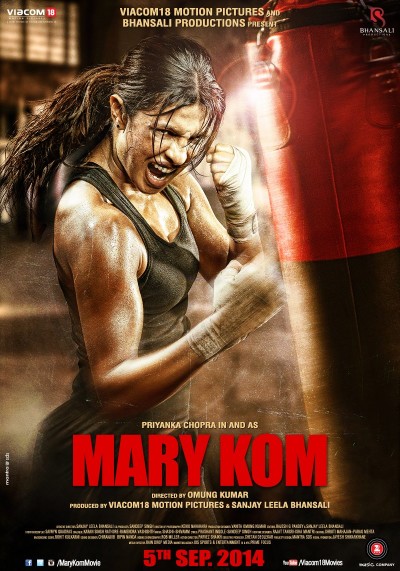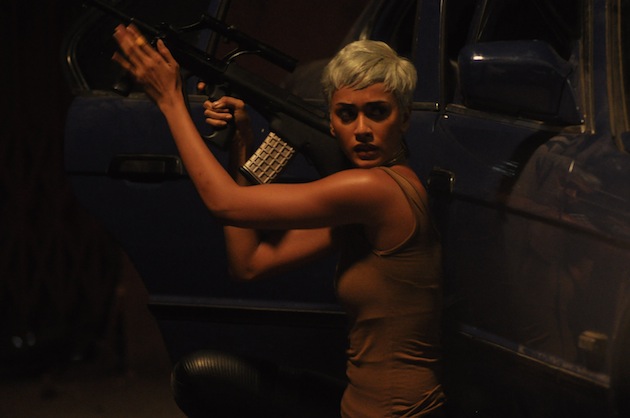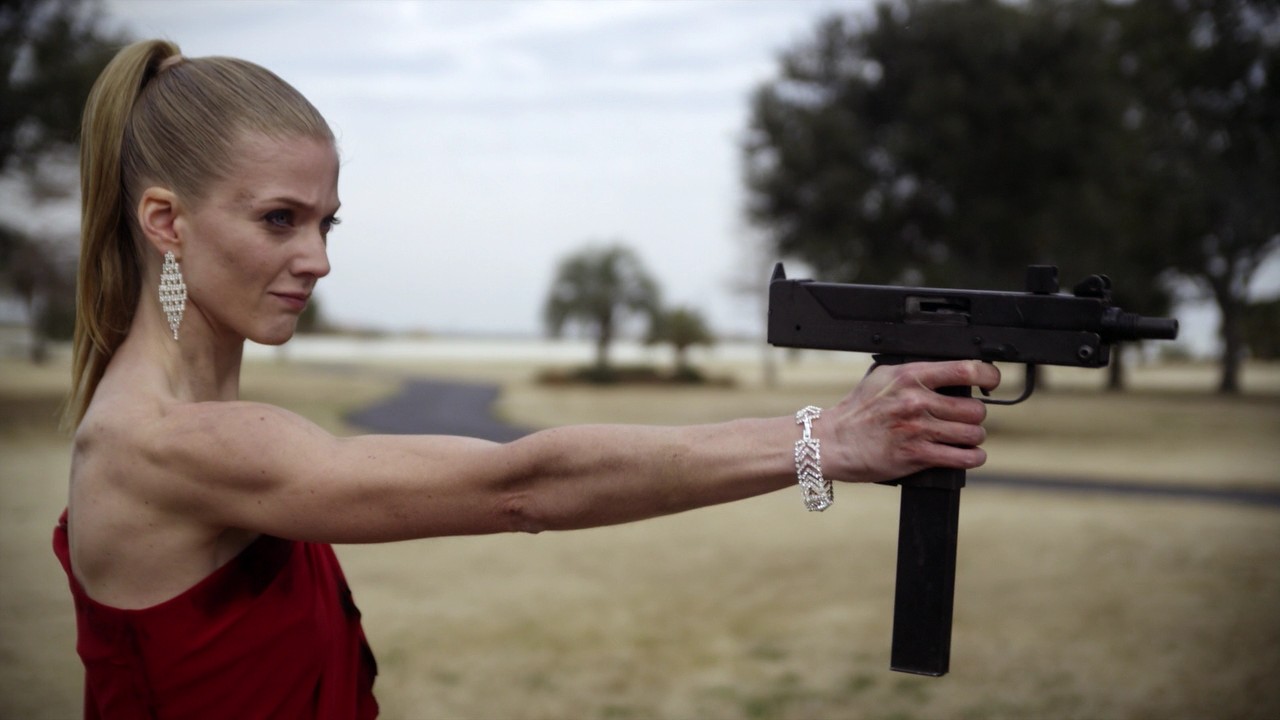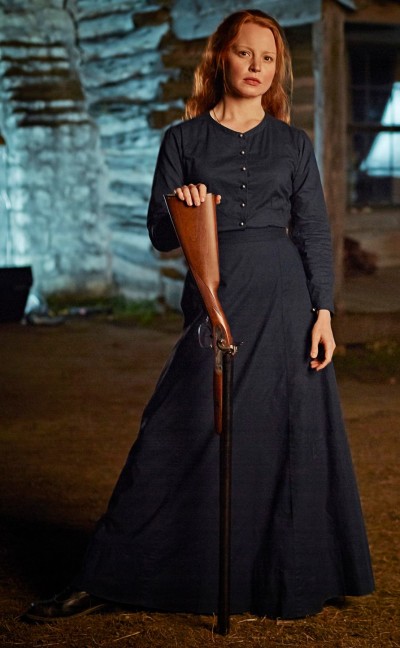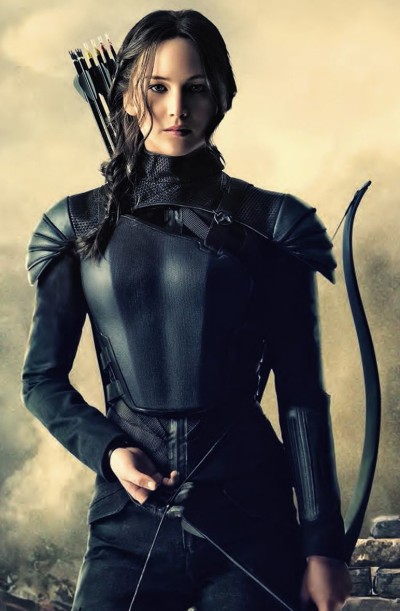★★★
“Why we don’t camp: Reason #134.”
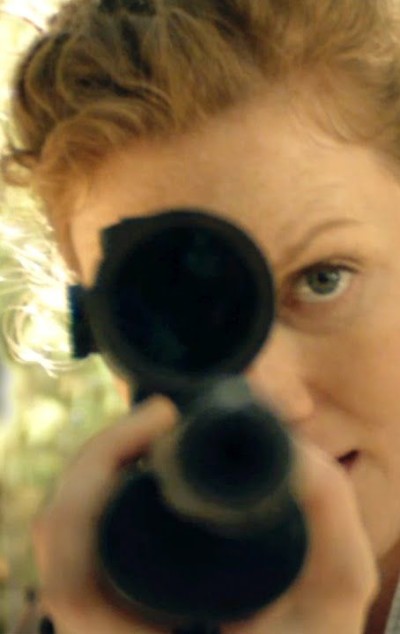 It was supposed to be a nice weekend of camping for husband and wife, Wit (Schmidt) and Mike (Staton), perhaps allowing them to rekindle a spark which has become lost in Mike’s career, though Wit is trying to pluck up the courage to tell him she’s pregnant. Hopes of either are derailed, when their trip becomes a three-way, as they are joined by Mike’s brother, Sean (Schreiber), recently discharged from the Army under circumstances that he won’t talk about. Unfazed by discovering the camp ground that’s their destination is closed, they proceed, Wit learning the ropes of hunting from the two brothers. But the next morning, the three wake up to find themselves stripped of all supplies, down to their shoes, and with a black X written on each of their foreheads. It’s clear somebody – or somebodies – is out to get them, and Wit is going to have to dig very deep and find a way to overcome her civilized sensibilities if she is to make it out alive.
It was supposed to be a nice weekend of camping for husband and wife, Wit (Schmidt) and Mike (Staton), perhaps allowing them to rekindle a spark which has become lost in Mike’s career, though Wit is trying to pluck up the courage to tell him she’s pregnant. Hopes of either are derailed, when their trip becomes a three-way, as they are joined by Mike’s brother, Sean (Schreiber), recently discharged from the Army under circumstances that he won’t talk about. Unfazed by discovering the camp ground that’s their destination is closed, they proceed, Wit learning the ropes of hunting from the two brothers. But the next morning, the three wake up to find themselves stripped of all supplies, down to their shoes, and with a black X written on each of their foreheads. It’s clear somebody – or somebodies – is out to get them, and Wit is going to have to dig very deep and find a way to overcome her civilized sensibilities if she is to make it out alive.
It’s a fairly straightforward survival horror, pitting (mostly) Wit against a trio of masked adversaries, who communicate solely through their mobile phones, also using them to record their kills, in what appears to be a none-too subtle jab at modern culture. Though it is, at least, refreshing to see a modern genre entry which does not include a scene of a character looking at their film and sighing, “No signal…” The transition of Wit, from a vegan who is unable to take an animal’s life – albeit one that’s a trained trauma nurse, and so not exactly fazed by the sight of blood – into a ruthless killing machine, prepared to do anything necessary to survive, is well-managed, with Schmidt, best known for her role in Boardwalk Empire, making for a solid heroine.
Less effectively handled are the relationships between her and the two men, to the extent that neither are necessary to the movie at all. They’re disposed of with relatively little effort, arguably leaving the first half of the film as a waste of time. Nothing much comes, for example, of Sean’s apparently blossoming PTSD, nor do we find out the reason for his discharge. Additionally, early on, it does seem like the attackers have a supernatural aspect, as shown in their ability to absorb punishment and keep on coming, as well as whisking the trio’s tents away without even waking them. Yet this turns out clearly not to be the case, leaving these earlier instances of invulnerability unexplained, and there are too many echoes of another movie with similar themes, Eden Lake. The film is a great deal better when it’s just Wit against the wildlings, and when it reaches there, it’s actually impressively brutal. Just a shame it takes longer than it should to find its footing.
Dir: Christopher Denham
Star: Wrenn Schmidt, Pablo Schreiber, Aaron Staton, Cody Saintgnue





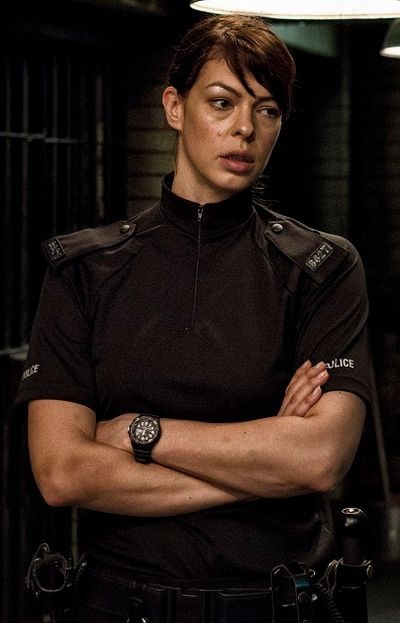
 I’m not religious, but I do enjoy a good religious movie. Say what you like about the Bible, it has some great stories, and inspiration for a ton of others [some day, I want to see the Book of Revelations filmed by Paul Verhoeven]. This certainly falls into the latter camp, but the small cast and claustrophobic settings work for it very well. On the way to take up a new post at a police station in a small Scottish town, Rachel (McIntosh) witnesses a pedestrian being hit by a joy-riding teenager, though the victim is nowhere to be found. Taking the perp to the station, the victim (Cunningham), known only as “Six” (after his eventual cell number), is located and brought to the station: but the doctor brought in to check his wounds tries to kill him. It becomes clear that Six knows a lot more, not just about Rachel, but her new boss Sergeant MacReady (Russell), and the other inhabitants of the station, on both sides of the bars. That’s dangerous knowledge, since some of those are definitely not intended for public consumption. Rachel, whose secret involved hurt done to rather than by her, has to figure out Six’s agenda – Devil? Angel? Bit of both? – to survive the night.
I’m not religious, but I do enjoy a good religious movie. Say what you like about the Bible, it has some great stories, and inspiration for a ton of others [some day, I want to see the Book of Revelations filmed by Paul Verhoeven]. This certainly falls into the latter camp, but the small cast and claustrophobic settings work for it very well. On the way to take up a new post at a police station in a small Scottish town, Rachel (McIntosh) witnesses a pedestrian being hit by a joy-riding teenager, though the victim is nowhere to be found. Taking the perp to the station, the victim (Cunningham), known only as “Six” (after his eventual cell number), is located and brought to the station: but the doctor brought in to check his wounds tries to kill him. It becomes clear that Six knows a lot more, not just about Rachel, but her new boss Sergeant MacReady (Russell), and the other inhabitants of the station, on both sides of the bars. That’s dangerous knowledge, since some of those are definitely not intended for public consumption. Rachel, whose secret involved hurt done to rather than by her, has to figure out Six’s agenda – Devil? Angel? Bit of both? – to survive the night.